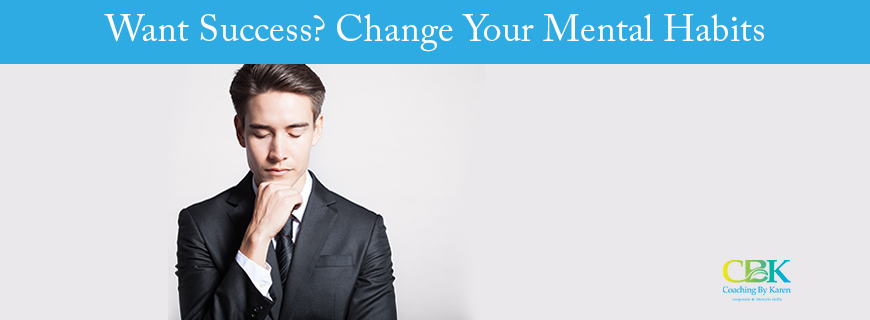If You Want Success, Change Your Mental Habits

By Executive Coach, Karen Nutter
Let me ask you something…
Do you ever feel tired before you even get out of bed?
Have you ever made quick decisions, in business or otherwise, that led to negative consequences?
Have you ever gotten upset and said things you regret?
Do you ever get nervous when going into a meeting?
What if you could change each of those situations and handle them more effectively and with greater ease and energy? While I don’t want to sound too much like an infomercial, I want to tell you that You Can!
Over the years as I have worked with many clients on developing their Emotional Intelligence, I have found that the number one cause of personal and professional issues is a result of ineffective mental habits. Mental habits are our automatic reactions to internal and external stimuli.
Do any of these reactions sound familiar?
- When you feel tired or burnt out, you can’t relax enough to sleep restfully and you get caught in a repeating cycle.
- When someone says or does something negative to you, you get upset.
- When you feel stressed, you rush.
- When you are in crisis, you engage in fight or flight.
These responses are often taught to us by our parents, teachers, and other influencers in our lives, but each of us has the power to change how we respond to internal and external stimuli. While Emotional Intelligence (EQ/EI) is a combination of five dimensions, the true “power of EQ” comes from taking control of our own focus and awareness.
When you experience something unpleasant, how do you react? Do you react with instant anger and attack, or do you shut down and walk/run away? When you react, do you think about it first and decide how you want to respond, or does it just come out of you without any thought?
For most people, our reactions to different situations are automatic, we don’t think about how we are going to respond, we just do it. But, that’s not usually a good thing. When we can stop, breathe, and think before we respond, we are much more likely to create a positive environment for everyone. This process applies to every internal and external stimuli, from dealing with an angry co-worker, to creating a calm atmosphere that encourages creativity. Managing our focus and awareness of our own thoughts and emotions can positively affect every part of our life.
“Between stimulus and response, there is a space. In that space is our power to choose our response. In our response lies our growth and our freedom.” Viktor Frankl
So, how do we access that space and open ourselves up to the power it provides? We change our mental habits and create that space through focus moments. Focus moments are exactly what they sound like – moments in time when we concentrate on what we are doing, and become aware of ourselves and our situation.
For instance, when you are headed into an afternoon meeting after a full day of activity, and your brain is tired, take 2 minutes before the meeting and focus only on listening to what’s around you. Close your eyes and listen to your breath, see how many different sounds you hear, and take deep breaths to help relax your muscles and release the stress that has built up. While you are focusing on the moment, try to only concentrate on the sounds, and not on the upcoming meeting, or past moments of the day. The idea is to focus only on that exact moment, and to let go of all other thoughts and emotions. This focused moment can help you re-energize and re-group for the meeting, and allows you to release all the other moments of your life and the stressors they may bring.
When in the meeting, if someone becomes negative, rather than respond as you normally would, stop your patterned thoughts and try to assess the situation from a non-judgmental point of view. Create the space between the stimulus and response, and use your growing EQ Empathy to help you listen and understand where your co-worker is coming from. The key is to give yourself a moment or two to create a thoughtful response, instead of an automatic one.
Just A Moment
Focused moments can happen at any point in time, and the more often you take time to focus and clear your mind of the cluttered thoughts, the more relaxed and effective you can be. People who create focused moments first thing in the morning are often less stressed and more productive throughout the day. If you create a focused moment when you go to bed, you are more likely to fall asleep faster, and have a deeper, more restful night.
Like any positive habit, the more you do it, the easier it is and the more you benefit. And, with focused moments, you don’t need to invest long periods of time, even a minute or two can create the space necessary to respond more positively.
I recommend you start by creating 3 focused moments each day: one before you get out of bed in the morning, one mid-day, and one when you go to bed at night. Use your phone to set your reminders, and then try to focus for 2 minutes each time. See how you feel after 5 days and let me know what you experience.
I think I’ll engage in a focused moment right now!

